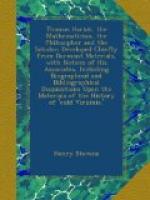The history of Hariot’s Praxis has attracted a great deal of attention for more than two centuries and has long been obscured by many misconceptions and erroneous statements. In the first place it has been always said from the days of Collins that it was edited by Walter Warner, and Wood adds that Warner was to have his pension continued by Algernon Percy, for that scientific labor. There is evidence that Warner, though employed on the work by Sir Thomas Aylesbury, was not the sole editor. See Aylesbury’s Letter to the Earl on page 189.
The book led to a great deal of international or patriotic controversy, and with great injustice to Hariot was treated by the English advocates as his masterpiece in science. Wallis in 1685 in his History of Algebra, after much correspondence with Collins and others on the subject between 1667 and 1676, became Hariot’s English champion. The controversy respecting the Methods of Hariot and of Descartes became as warm as that respecting the discoveries of Leibnitz and of Newton.
Wallis ranked Oughtred’s Clavis and Hariot’s Praxis very high, and because both were first printed in 1631, treated them as productions or inventions of that year, whereas Hariot’s method, as we have seen, had been long practically before his disciples; and was, ten years after the author’s death, given to the world avowedly as an’ accessory’ only, or preliminary treatise, that it ’might suitably serve as a necessary preparation or introduction to the study of Hariot’s remaining works, the publication of which is now under serious consideration.’ Unfortunately this excellent scheme fell through, probably in consequence of the death of the Earl of Northumberland, and perhaps partly because of the death of Nathaniel Torporley who had long been engaged in ’ penning the doctrine’ of Hariot’s mathematical papers. They both died in 1632, shortly after the publication of the Praxis. Wallis’s charge had a basis of truth, but it was narrow and petty. As an Algebraist he seems to have lost sight of the main point, that Descartes’ great work was on Geometry and not on Algebra, and that Hariot’s method, though first printed in 1631, was almost as old as Descartes himself. Montucla the French mathematician, near the close of the last century, in his History of Mathematics, summed up the controversy raised by Wallis including the minor one raised by Dr Zach in 1785, clearing Descartes of Wallis’s charges and relegating Hariot to the respectability of a second-rate mathematician. If Montucla’s verdict be based on mathematical reasoning as loose and slipshod as is his statement of the historical points of the case, to say nothing of his utter ignorance of Hariot’s biography and true position as an English man of science, one feels justified in rejecting it as worthless : as one also is compelled to do the vapid conclusions drawn from Montucla which have since found their way into many recent biographical




